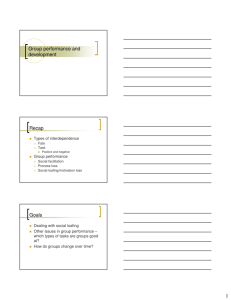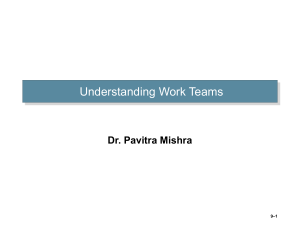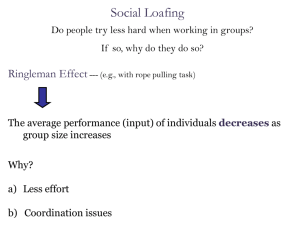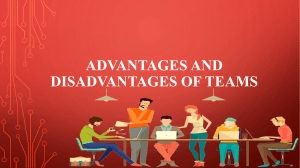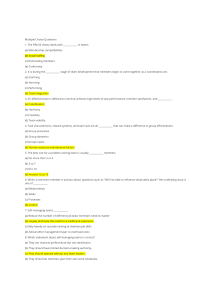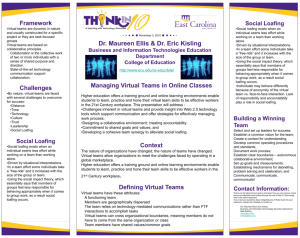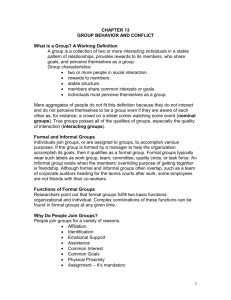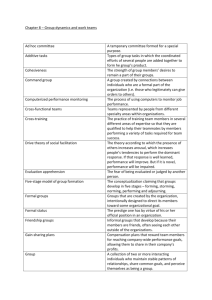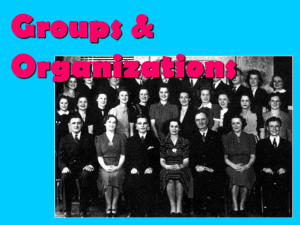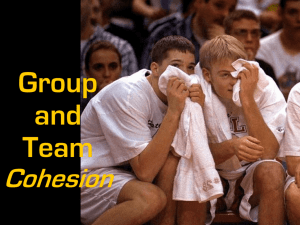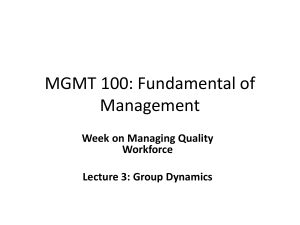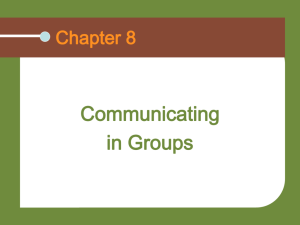Week 7: Working in Teams
advertisement
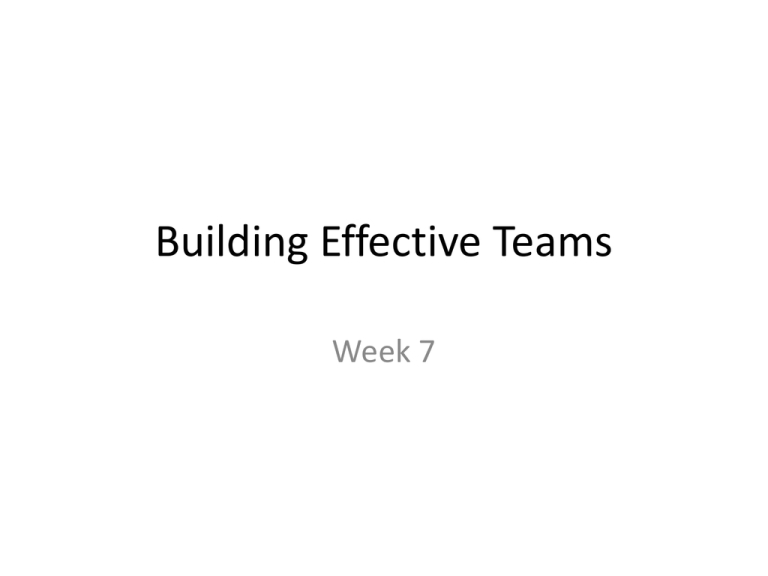
Building Effective Teams Week 7 Question • Which adage would you agree with more: – “Many hands make light work!” or – “Too many cooks spoil the broth?” • Teams are popular, but does a team mean “Together Everyone Achieves More”? Stages of Team Development (Tuckman, 1965) • Five-Stage Model – Forming • Everyone tests the waters, tries out their roles – Storming • Power struggles between people asserting their dominance – Norming • Close relationships are formed (camaraderie) • Unspoken assumptions now dictate behavior – Performing • All energies are directed to completion of tasks – Adjourning • Team prepares for disbanding 3 Punctuated Equilibrium (Gersick, 1988) • Phase 1 – First meeting sets the team’s direction – Little progress is made • Phase 2 – Turning point at the half-way mark – A new direction is set – Higher performance • Criticisms taken seriously, views discussed openly – Some additional revolutions will occur towards the end 4 Marketing Plan • Form your “book project group” and pair up with one other group. • Each mega-team will have half of its members outside the classroom: you can only communicate with the technology that you have with you. • 30 minutes to prepare. • Your mega-team will have to come up with a marketing plan for a new product: something that would appeal to Pet Owners (e.g., “Uni-cat”) • Your team will make a 10-minute PowerPoint presentation to the rest of the class. 5 Marketing Plan • The 4 Ps of marketing plans are: – Product (e.g., features, details), – Price, – Placement (i.e., where/how it can be purchased), and – Promotion (e.g., advertising campaigns). • Ten minutes (max) to present your ideas, everyone presents. Marketing Plan • How was the coordination among team members? – and across “offices”, specifically? • How did you make decisions? • What did you do well / not so well? 8 Building Effective Teams • Composition – Personality • Conscientiousness, Openness to Experience • Agreeableness (in moderation) – Knowledge, Skills, Abilities • Technical expertise, problem-solving, and social skills – Size • Depends on task, but no bigger than necessary 9 Building Effective Teams • Context – Adequate resources • Technology, staffing, information – Leadership • From a team member, or from many team members, or an outsider – Performance evaluation and rewards • Team-based rather than individual-based • Low pay dispersion • Distributive, procedural, interpersonal, informational justice 10 Building Effective Teams • Process – Common Purpose: specific goals • From “goal setting theory” – Team efficacy • From “self efficacy” – Conflict • Too much is bad, too little is also bad, some is ok • Relationship vs. Task Conflict – Social Loafing • Why do some people not do their share? 11 Social Loafing • Members exert less effort when working in teams than working alone • Factors that affect: – Team size (+) – Team produces single output (e.g., report) (+) – Interestingness of the task (-) – Importance of objective (-) – Value team membership and objectives (-) 12 How to Manage Social Loafing • Discuss expectations • Make individual performance more visible – Specialize tasks – Feeling that inputs are necessary for team success • Increase performance feedback – Might not be aware of poor performance • Make tasks more interesting and important – Divide tasks based on expertise and preference • Punishment warnings in advance (deter) 13 Group Activity • Develop a list of all the tasks that will be necessary for your project. Divide the work up. Who will do what? Everyone must agree to the plan. What are your timelines? • What will be the biggest challenges that your team is likely to face, based on your prior experiences with group work? • Discuss how such challenges might best be handled. What are your contingency plans? • Be prepared to report at least THREE recommendations to the class. The Romance of Teams • What is the main argument of the article? • What did you agree with? • What did you disagree with? • What else should the authors have included? • What is your overall assessment?
